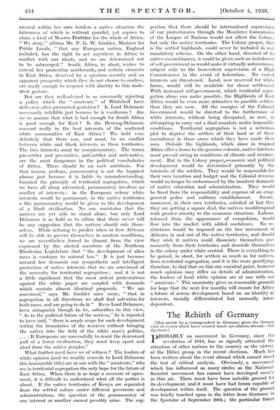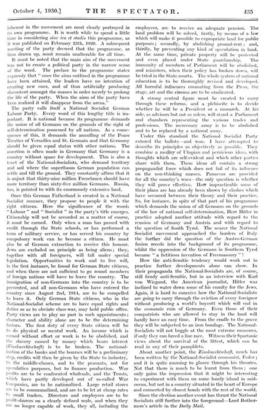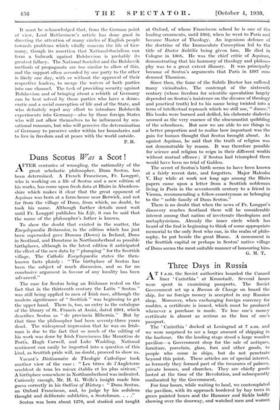The Rebirth of Germany
[This article by a correspondent in Germany gives the German view of events which have created much speculation abroad.—Ed.
Spectator.]
PROBABLY no movement in Germany, since the revolution of 1918, has so signally attracted the attention of other nations to the country as the victory of the Hitler group in the recent elections. Much has been written about the event abroad which cannot stand the test of critical analysis. Obviously, a movement which has influenced so many circles as the National- Socialist movement has cannot have developed merely ill thin air. There must have been suitable ground for its development, and it must have had forces capable of development within itself. The question of the ground was briefly touched upon in the letter from Germany in the Spectator of September. 20th; the particular forces inherent in the movement are most clearly portrayed in its own programme. It is worth while to spend a little time in considering sine ira et studio this programme, as it was published on February 25th, 1920. A subsequent meeting of the party decreed that the programme, as thus drawn up, must remain unalterable for all time.
It must be noted that the main aim of the movement was not to create a political party in the narrow sense of the word. The preface to the programme states expressly that "once the aims outlined in the programme have been attained, the leaders have no intention of creating new ones, and of thus artificially producing discontent amongst the masses in order merely to prolong the life of the party. When the aims of the party have been realized it will disappear from the arena."
The party calls itself a National Socialist German Labour Party. Every word of this lengthy title is im- portant. It is national because its programme demands the union of all Germans on the grounds of the right of self-determination possessed by all nations. As a conse- quence of this, it demands the annulling of the Peace Treaties of Versailles and St. Germain and that Germany should be given equal status with other nations. The assertion is often made in Germany that Germany is a country without space for development. This is also a tenet of the National-Socialists, who demand territory and soil where the superfluous German population can settle and till the ground. They constantly affirm that it is unjust that thirty-nine million Frenchmen should have more territory than sixty-five million Germans. Russia, too, is pointed to with its enormously extensive land.
Once this German Fatherland is created in a National Socialist manner, they propose to people it with the right citizens. Here the significance of the words " Labour " and " Socialist " in the party's title emerges. Citizenship will not be accorded as a matter of course, it must be earned. Only when a man has passed with credit through the State schools, or has performed a term of military service, or has served his country by compulsory work can he become a citizen. He must also be of German extraction to receive this honour. Jews are excluded on principle as being aliens ; they, together with all foreigners, will fall under special legislation. Opportunities to work and to live will, in the first instance, be found for German State citizens, and when there are not sufficient to go round members of foreign nations will have to leave the country. The immigration of non-Germans into the country is to be prevented, and all non-Germans who have entered the country since August 2nd, 1914, are to be compelled to leave it. Only German State citizens, who in the National-Socialist scheme are to have equal rights and duties so as to obviate class-war, may hold public office. Party views are to play no part in such appointments ; character and ability alone arc to be the determining factors. The first duty of every State citizen will be to do physical or mental work. An income which is earned without effort or work is to be abolished, and the slavery caused by money which bears interest (Zinsknechtschaft) is to be broken. The national- ization of the banks and the bourses will be a preliminary step, credits will then be given by the State to industry, to the middle-classes, and to the peasants, not for speculative purposes, but to finance production. War Profits are to be confiscated wholesale, and the Trusts, Which have partly developed out of so-called War Companies, are to be nationalized. Large retail stores arc to be communalized, and are to be let at cheap rates to small traders. Directors and employees are to be profit-sharers on a clearly defined scale, and when they are no longer capable of work, they all, including the
employees, are to receive an adequate pension. The land problem will be solved, firstly, by means of a law which will make it possible to expropriate land for public purposes ; secondly, by abolishing ground-rent ; and, thirdly, by preventing any kind of speculation in land. At the same time, private property will be protected and even placed under State guardianship. The immunity of members of Parliament will be abolished, and ministers, when their policy has broken down, will be tried in the State courts. The whole system of national education is to be thoroughly revised and developed. All harmful influences emanating from the Press, the stage, art and the cinema are to be eradicated.
A strong central figure must be created to carry through these reforms, and a plebiscite is to decide whether he will be a President or a monarch. At his side, as advisors but not as rulers, will stand a Parliament and chambers representing the various trades and professions. The mercenary army is to be abolished and to be replaced by a national army.
Under this standard the National Socialist Party entered the ballots—and won. I have attempted to describe its principles as objectively as possible. They combine a medley of Utopian and pernicious ideas, with thoughts which are self-evident and which other parties share with them. These ideas all contain a strong propagandist force which does not fail of its influence on the non-thinking masses. Panaceas are provided for all the country's woes—the only question is whether they will prove effective. How impracticable sonic of their plans are has already been shown by clashes which have occurred between their theory and their practice. So, for instance, in spite of that part of his programme which demands the union of all Germans on the grounds of the law of national self-determination, Herr Hitler in practice adopted another attitude with regard to the reunion of Germany and Austria and with regard to the question of South Tyrol. The nearer the National Socialist movement approached the borders of Italy the further did the question of the Austro-German fusion recede into the background of its programme, whilst the oppression of the Germans in Southern Tyrol became "a fictitious invention of Freemasonry " !
How the anti-Semitic tendency would work out in practice further developments alone can show. In their propaganda the National-Socialists are, of course, still firmly anti-Semitic, but in an interview with Karl von Wiegand, the American journalist, Hitler was inclined to water down some of his enmity for the Jews. Again, it is hard to conceive how the National-Socialists are going to carry through the eviction of every foreigner without producing a world's boycott which will end in the economic ruin of Germany. Even those of their compatriots who are allowed to stay in the land will hardly have an easy time. From the cradle to the grave they will be subjected to an iron bondage. The National- Socialists will not boggle at the most extreme measures, if only they can breed a fine race. Witness their Spartanic views about the survival of the fittest, which can be read in any of their pamphlets.
About another point, the Zinsknechtschaft, much has been written by the National-Socialist economist, Feder ; and it is quite amusing to glance through his theories. Not that there is much to be learnt from them ; one only gains the impression that it might be interesting to experiment with them on some lonely island in mid- ocean, but not in a-country situated in the heart of Europe and connected by closest bonds with the rest of the world.
Since the election another event has thrust the National Socialists still further into the foreground—Lord Rother- mere's article in the Daily Mail,
It must be acknowledged that, from the German point of view, Lord Rothermere's article has done good in directing the attention of many circles of English people towards problems which vitally concern the life of Ger- many, though its assertion that National-Socialism can form a bulwark against Bolshevism is probably its greatest fallacy. The National Socialist and the Bolshevik methods of propaganda are too similar to allow of this, and the support often accorded by one party to the other is likely one day, with or without the approval of their respective leaders, to merge the waters of both parties into one channel. The task of providing security against Bolshevism and of bringing about a rebirth of Germany can be best solved by those parties who have a demo- cratic and a social conception of life and of the State, and who definitely repel any effort to introduce Bolshevik experiments into Germany—also by those foreign States who will not allow themselves to be influenced by sen- sational rumours, but who will perceive the determination of Germany to preserve order within her boundaries and to live in freedom and at peace with the world outside.
P. B.






















































 Previous page
Previous page